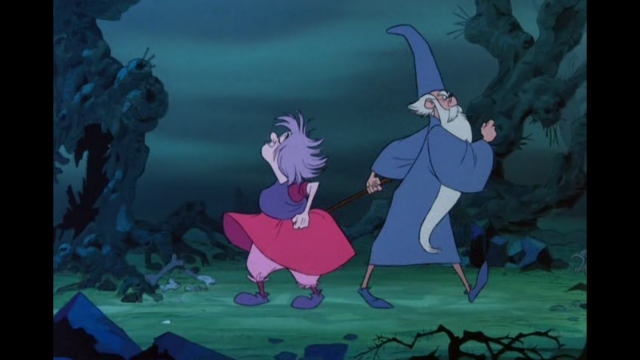Irene asked to watch this earlier this week. Or anyway she shoved the box at me repeatedly; she’s preverbal, mostly, and certainly she won’t be two until February, so when she expresses preference and I’m not doing anything else, I’m likely to give my daughter her way. Also, it turns out there’s a live-action remake in the works, and as a charter member of the I Like The Original Pete’s Dragon Better Club, I figure I better talk about this version before everyone forgets it exists.
Young Wart (Rickie Sorenson and both Richard and Robert Reitherman) is a foundling taken in by Sir Ector (Sebastian Cabot). He’s basically assigned as a servant to Ector’s beefy son Kay (Norman Alden). One day, Kay is hunting. Wart is above him on a branch which gives way, causing Kay to miss his shot. Wart goes into the forest after the arrow, where he meets the great wizard Merlin (Karl Swenson) and his Highly Educated Owl, Archimedes (Junius Matthews). Merlin knows that Wart is Somebody and takes it upon himself to educate the boy. Mostly by turning the two of them into animals.
Meanwhile, England has fallen into decay and anarchy because the old king, Uther Pendragon, died with no heir. There has been, for at least a decade, a sword stuck into an anvil on top of a stone in a churchyard bearing the legend, “Whoso pulleth out this sword from this stone and anvil is rightwise born King of All England.” But of course no one can do it, and the decision has been made to have a tournament and just declare the winner king, which is exactly the same thing and I’m sure that God, who provided the sword in the first place, will be totally cool with that.
I mean, even if you didn’t know the legend of the sword, you’d know from the title and the opening sequence that, by the end of the story, that kid’s going to pull out that sword. So of course it’s on the poster, and there’s not a whole lot of suspense going in this particular movie. That’s okay. The thing about a Disney movie based on source material, as most of them are, is that we’re in it as much for the journey as the destination. We’re hoping to get a babysitter next month so we can see Ralph Breaks the Internet, and honestly, I’m not hugely expecting to be surprised by the destination there, either. The destination of these movies is a Happy Ending, or at least the happiest one available for the largest number of characters. Sometimes even the villain’s sidekicks.
If you ask people who haven’t seen this movie, they’ll probably tell you that the villain of the movie is Madam Mim (Martha Wentworth). After all, the Wizards’ Duel sequence is justly famous, and apparently she’s a boss in one of the Kingdom Hearts movies. She’s certainly been accepted into the official pantheon of Disney Villains for marketing purposes. Which hides the fact that her entire appearance can’t be more than about ten minutes long. She’s a bit more Tamatoa in Moana, inasmuch as she’s there for a song and a bit of conflict that could be excised without too much damage to the plot—less, in Mim’s case, because she doesn’t even have anything Our Heroes want.
There is also the Skinniest Wolf In England hanging about, trying to eat Wart, whether he’s a boy or a squirrel, but he’s more a force of nature than a villain. If anyone is the villain, it’s Sir Ector, who took in an orphan, gave him a cruel nickname, and made a servant out of him while emphasizing that he was unfit to be anything more by the standards of the time. Sure, that’s a better life than he might otherwise have expected as a foundling. After all, he’s lived this long. But Ector is a pompous, arrogant fool who reminds me a bit of the popular image of Henry VIII—and is doing just as much to stand in the way of a future great monarch, come to that. Though I suppose he didn’t actually kill Wart’s mother.
Merlin in this movie, aside from slightly resembling Walt, is torn. He prefers the logic and reason of the future, but he doesn’t like the fuss that goes with it. He thinks it’s a mess, but he doesn’t like the lack of conveniences of the Middle Ages. No fan he of the crumbling tower. (Which, to a scholar of the period, tells you a great deal about Sir Ector’s finances—no one who could afford the repairs would leave the tower in that shape; its fall would damage his walls and leave him open to attack.) I think he is proof that there is really no such thing as a Golden Age; it’s all about what inconveniences you prefer.
Help finance that trip to the movies; consider supporting my Patreon!

